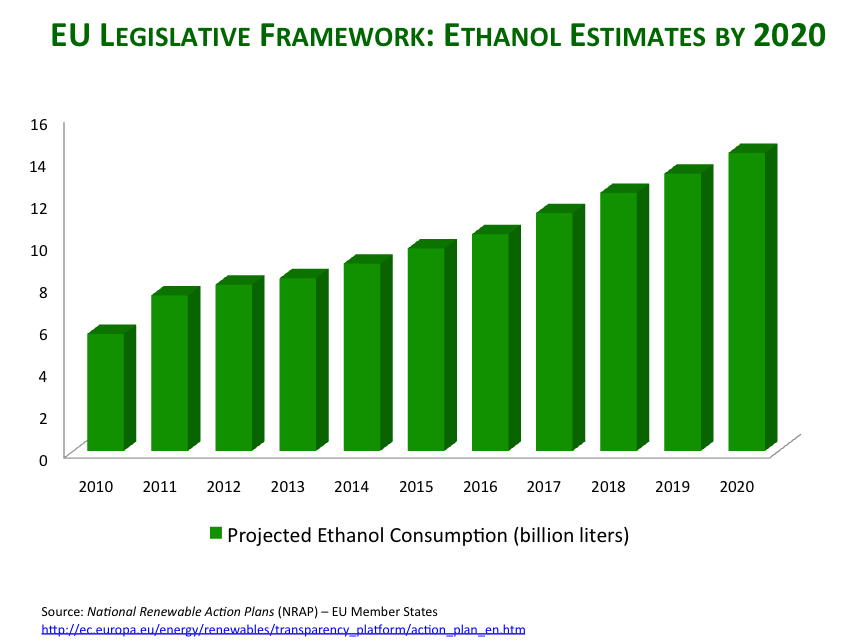POLICIES IN THE EUROPEAN UNION
EU Ethanol Policy
With total consumption that reached approximately 7 billion liters in 2015, the European Union (EU) is the fourth largest market for ethanol in the world. Although the EU biofuels market is dominated by biodiesel (80 percent), ethanol consumption has increased more rapidly than other biofuels in the last years.
The EU regulatory framework for biofuels is based on four main Directives adopted in 2008, 2015 and 2018:
- The Directive on the promotion of the use of energy from renewable sources that requires 10 percent of the energy used in transport to come from renewables by 2020.
Although no dedicated quota was allocated to specific energy sources, most of this 10 percent is expected to come from liquid biofuels. This regulation replaces Directive EC 2003/30, which established a non-binding target of 5.75 percent for biofuels consumption in 2010.
- The Fuel Quality Directive requires greenhouse gas emissions from transport fuels be reduced by 6 percent by 2020.
- The so-called ILUC Directive which amends the two previous texts as far as indirect land use change is concerned. The participation of conventional biofuels in the 10% target is limited to 7%. The indicative target for advanced biofuels is 0.5%.
- The new Renewable Energy Directive (recast) that covers the period 2021 to 2030.
The EU is conditioning the mandatory target for biofuels on compliance with three main sustainability criteria.
- A reduction of at least 35 percent of greenhouse gas emissions until 2017 when the threshold increases to 50 percent (60 percent for new plants).
- No production in areas with high carbon stocks (like forests and wetlands) or in areas of high biodiversity (such as forests, wetlands, preserved areas, and highly biodiverse grasslands).
- Reporting obligation on practices to protect soil, air and water quality, and on the ratification by biofuels exporting countries of some International Labour Organization and environmental conventions.
Based on this Directive, EU member states have elaborated their national action plans to reach the 10 percent target. Most of them have adopted mandatory blends and some countries provide fiscal incentives.
The EU ethanol market is highly protected
The EU imposes a € 0.19/liter (around US$ 0.72/gallon) tariff on undenaturated ethanol. The import duty for denaturated ethanol is € 0.10/liter (approximately US$ 0.38/gallon). The tariff does not distinguish between the different uses of ethanol (beverage, fuel, industrial).
After 20 years of negotiations, the EU and Mercosur countries successfully closed an agreement of principle for the conclusion of a free-trade agreement on June 28, 2019. This agreement will provide for a more favorable treatment for Brazilian ethanol exports to Europe in the form of a TRQ (650,000 tons) with reduced intra-quota duties.
New non-tariff barriers, such as sustainability criteria, are emerging and their potential to limit trade in biofuels is significant. These measures must be enacted in a transparent way and respect international trade laws. Otherwise, they run the risk of being challenged at the World Trade Organization.
